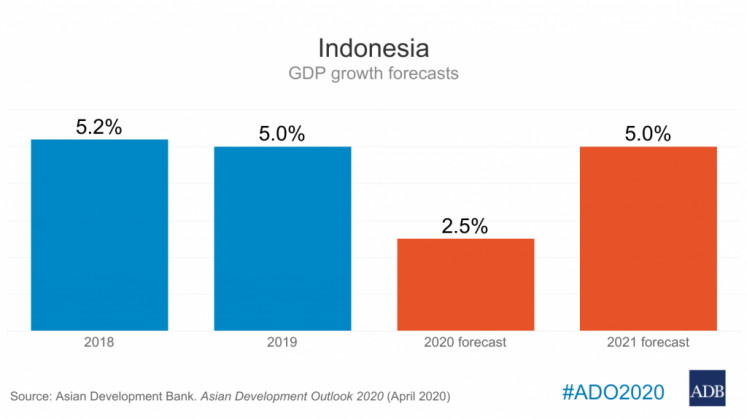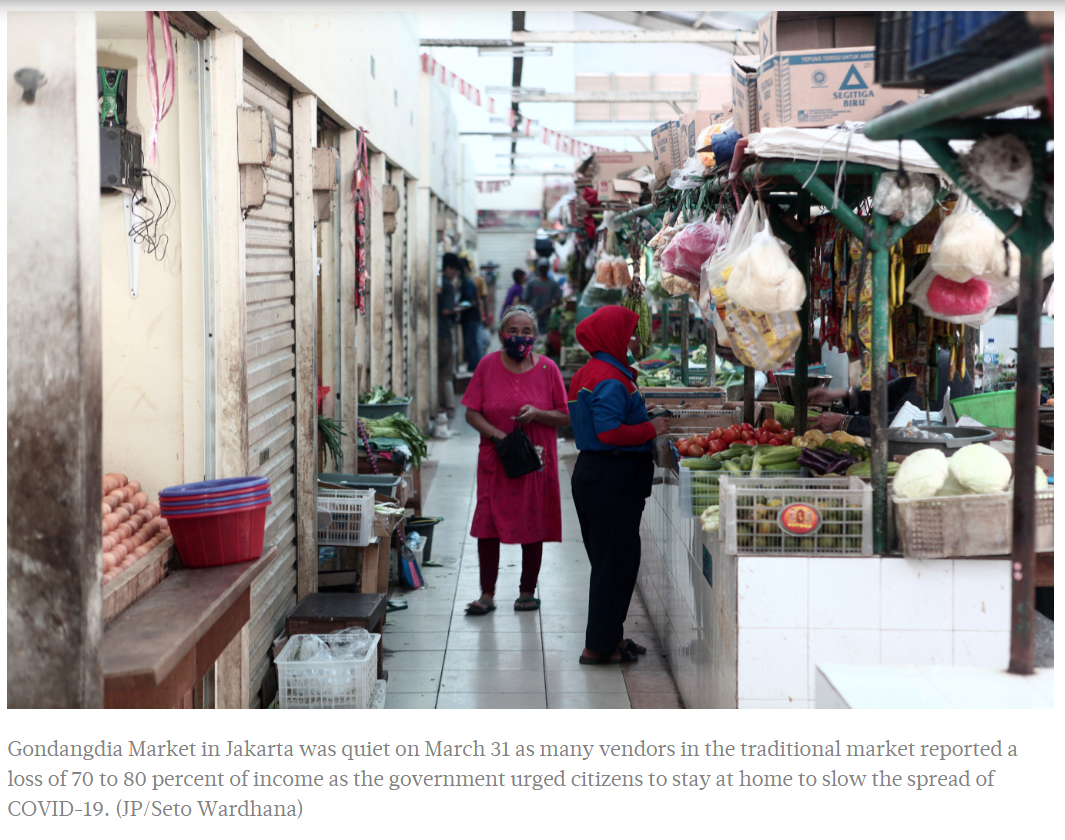ADB projects Indonesia’s economy to grow 2.5% in 2020
Indonesia’s economy is expected to grow by only 2.5 percent this year, from a four-year low of 5.02 percent in 2019, according to a new Asian Development Bank (ADB) report. The situation, caused largely by the COVID-19 outbreak, is expected to gradually improve in 2021.
ADB’s flagship annual economic publication titled “Asian Development Outlook 2020” indicates that the COVID-19 pandemic, along with lower commodity prices and volatile financial markets, will have severe implications for the global economy and Indonesia this year, with the economies of the country’s key trading partners expecting to suffer.
“Despite Indonesia’s strong macroeconomic fundamentals, the COVID-19 outbreak has changed the course of the economy, with the external environment deteriorating and domestic demand weakening,” ADB country director for Indonesia Winfried Wicklein said in a press statement released Friday.
“If decisive actions to contain the health and economic impacts of the outbreak, particularly to safeguard the poor and vulnerable, can be effectively implemented, the economy is expected to gradually return to its growth trajectory next year,” he added.
 Indonesia GDP growth forecasts by Asian Development Bank (ADB). (ADB/Asian Development Outlook 2020)
Indonesia GDP growth forecasts by Asian Development Bank (ADB). (ADB/Asian Development Outlook 2020)
ADB is among a slew of institutions predicting that the COVID-19 pandemic will significantly slow Indonesia’s economic growth this year. The World Bank, for instance, predicted that growth will sit at 2.1 percent in 2020, down from 5.1 percent initially projected, if the situation starts to normalize by June.
This compares with the government’s expectation of 2.3 percent economic growth in its baseline scenario this year, the lowest since 1999, which could deteriorate to a 0.4 percent economic contraction in a worst-case scenario.
The ADB report says domestic demand is expected to weaken, as business and consumer sentiment wanes. However, as the global economy is poised to recover next year, Indonesia’s growth is expected to gain momentum, with recently introduced investment reforms providing an additional impetus.
Inflation, which averaged 2.8 percent last year, is forecast to edge up to 3 percent in 2020, before declining to 2.8 percent in 2021, the report reads. Inflationary pressure from tight food supplies and currency depreciation is expected to be partially offset by lower prices for non-subsidized fuel, as well as additional subsidies for electricity and food.
Meanwhile, export earnings from tourism and commodities are projected to decline, leading to a current account deficit of 2.9 percent of GDP in 2020. As exports and investment resume in 2021, a higher volume of imported capital goods will keep the current account deficit at the same level as 2020.
ADB says the government and financial authorities have deployed “well-coordinated” and “targeted” fiscal and monetary measures to mitigate the impact of a pandemic on the economy and people’s livelihoods, including the “timely” disbursement of social transfers for the poor and vulnerable, as well as tax cuts and loan-payment relief for workers and businesses.
“Externally, risks to Indonesia’s economic outlook include an extended outbreak of COVID-19, further declines in commodity prices, and increased finance market volatility. Domestically, the outlook will depend on how quickly and effectively the spread of the pandemic can be contained. Constraints in the healthcare system, along with the challenges of imposing social distancing, could worsen the impact on the economy,” the press release reads.
Source: https://www.thejakartapost.com/news/2020/04/06/adb-projects-indonesias-economy-to-grow-2-5-in-2020.html


 English
English




